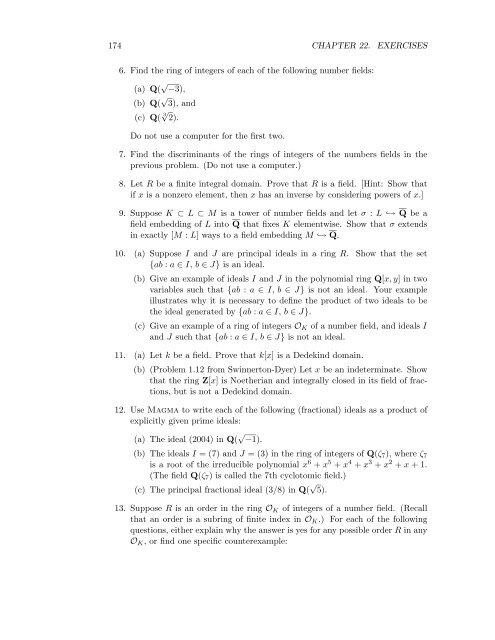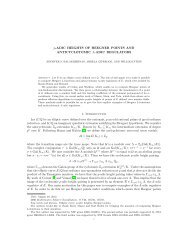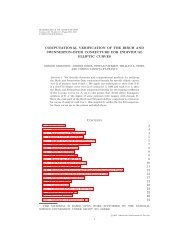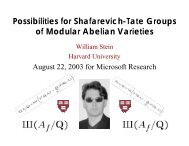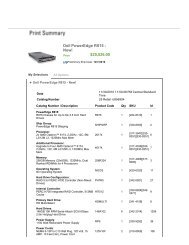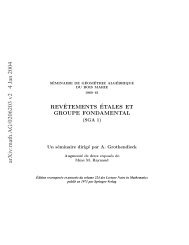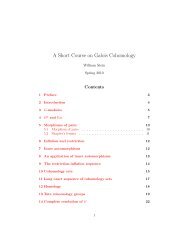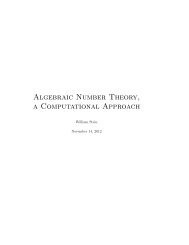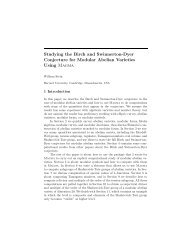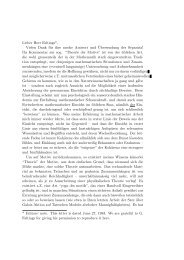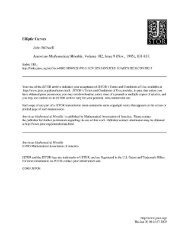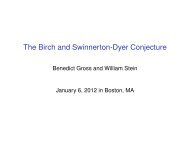A Brief Introduction to Classical and Adelic Algebraic ... - William Stein
A Brief Introduction to Classical and Adelic Algebraic ... - William Stein
A Brief Introduction to Classical and Adelic Algebraic ... - William Stein
You also want an ePaper? Increase the reach of your titles
YUMPU automatically turns print PDFs into web optimized ePapers that Google loves.
174 CHAPTER 22. EXERCISES<br />
6. Find the ring of integers of each of the following number fields:<br />
(a) Q( √ −3),<br />
(b) Q( √ 3), <strong>and</strong><br />
(c) Q( 3√ 2).<br />
Do not use a computer for the first two.<br />
7. Find the discriminants of the rings of integers of the numbers fields in the<br />
previous problem. (Do not use a computer.)<br />
8. Let R be a finite integral domain. Prove that R is a field. [Hint: Show that<br />
if x is a nonzero element, then x has an inverse by considering powers of x.]<br />
9. Suppose K ⊂ L ⊂ M is a <strong>to</strong>wer of number fields <strong>and</strong> let σ : L ↩→ Q be a<br />
field embedding of L in<strong>to</strong> Q that fixes K elementwise. Show that σ extends<br />
in exactly [M : L] ways <strong>to</strong> a field embedding M ↩→ Q.<br />
10. (a) Suppose I <strong>and</strong> J are principal ideals in a ring R. Show that the set<br />
{ab : a ∈ I, b ∈ J} is an ideal.<br />
(b) Give an example of ideals I <strong>and</strong> J in the polynomial ring Q[x, y] in two<br />
variables such that {ab : a ∈ I, b ∈ J} is not an ideal. Your example<br />
illustrates why it is necessary <strong>to</strong> define the product of two ideals <strong>to</strong> be<br />
the ideal generated by {ab : a ∈ I, b ∈ J}.<br />
(c) Give an example of a ring of integers OK of a number field, <strong>and</strong> ideals I<br />
<strong>and</strong> J such that {ab : a ∈ I, b ∈ J} is not an ideal.<br />
11. (a) Let k be a field. Prove that k[x] is a Dedekind domain.<br />
(b) (Problem 1.12 from Swinner<strong>to</strong>n-Dyer) Let x be an indeterminate. Show<br />
that the ring Z[x] is Noetherian <strong>and</strong> integrally closed in its field of fractions,<br />
but is not a Dedekind domain.<br />
12. Use Magma <strong>to</strong> write each of the following (fractional) ideals as a product of<br />
explicitly given prime ideals:<br />
(a) The ideal (2004) in Q( √ −1).<br />
(b) The ideals I = (7) <strong>and</strong> J = (3) in the ring of integers of Q(ζ7), where ζ7<br />
is a root of the irreducible polynomial x 6 + x 5 + x 4 + x 3 + x 2 + x + 1.<br />
(The field Q(ζ7) is called the 7th cyclo<strong>to</strong>mic field.)<br />
(c) The principal fractional ideal (3/8) in Q( √ 5).<br />
13. Suppose R is an order in the ring OK of integers of a number field. (Recall<br />
that an order is a subring of finite index in OK.) For each of the following<br />
questions, either explain why the answer is yes for any possible order R in any<br />
OK, or find one specific counterexample:


